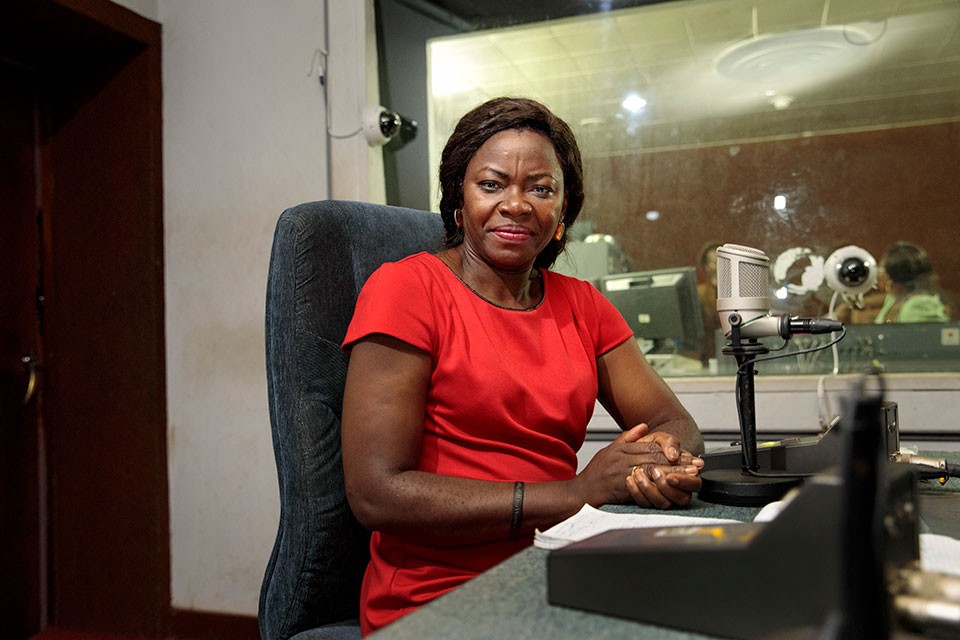Take five with Tchonko Becky Bessong: “With my voice, I can impact the masses”
Date:

Tchonko Becky Bessong is a popular radio presenter with CRTV, Cameroon’s public radio and television broadcasting company. Over 20,000 Cameroonians tune in to her weeklyprogramme ‘Calling the women’. UN Women works with journalists throughout the country, as part of its efforts to train media professionals in gender-sensitive reporting, funded by the Government of Sweden(SEED Fund). In the context of promoting women’s leadership and political participation, media is an important ally in awareness raising and shaping attitudes about women in leadership. In a recent conversation with UN Women, Ms. Tchonko talked about the situation of women’s political participation in Cameroon and the role that media can play in raising awareness. In the 2018elections the representation of women in the Senate increased from 20 per cent to 26 per cent.
What inspired you to become a radio presenter?
I have been a journalist for 20 years now. I grew up listening to the radio, and when I saw Cameroonian presenters like Melissa Nambangi and others on television, I thought, wow, let me try journalism.
People say I have a unique voice. When people watch television, they pay more attention to how you’re dressed, how your hair looks, and they miss the content. But on radio, with my voice, I can impact the masses.
Tell us about your radio show – what is it about?
My programme—Calling the Women— is about making women aware of their rights and the potential that they have within themselves and to take charge of their own destiny. But it’s not for women only, I have many men in the audience. Earlier, the programme used to be about women’s issues, but when the Millennium Development Goals came up, the station decided to integrate global concerns into the editorial content of programmes.
Recently, we ran a programme about the involvement of women in politics and another one on gender data. We got a lot of content from UN Women, flagship programme, Making Every Woman Count. In a country like Cameroon, where women outnumber men, policies need to look at data on women. You cannot shift policies if you don’t know how many women they will impact and how!
Do you also cover the topic of elections in your show and why?
We have hosted a series of programmes on women’s political participation during the last election (2018). In one of these programmes, we featured an American professor, who said something that we have used to generate many more discussions. She said, there should be substantive representation of women. If we can find women who are interested in politics, we should also find the men who feature the interests of women in their political agenda.
Leading up to the voter registration period, we ran many stories that were gender-sensitive. This led to more women registering as voters leading up to the October 2018 presidential elections. For me, gender-sensitive election reporting is not only about counting how many women are voting, but also, who are the candidates, and do they reflect the concerns of women in their political manifestos, and are the women who are voting aware of who they want to elect, who will take into account their needs?
What are the challenges that women in Cameroon face in terms of political participation?
Increasingly, Cameroonian women are becoming more aware that they should be involved in the political affairs of the state, and that they should be able to do that independent of their husband’s opinions. But they still need the courage, and they are still doubting that they can stand as candidates. If you look at our local councils, most of the women who are in municipalities are deputy mayors. But why? When you’re a deputy, you cannot make final decisions!
We still need a lot of awareness, and another crucial problem is funding. There are young women who want to be mayors, who want to enter politics, but lack the financial resources to fund their campaign or to start initiatives for their community. Women and the masses now know they should be able to vote for a female leader, but they need that female leader to be confident and financially independent.
What story are you working on next?
Right now, I am working on developing a programme on trafficking in women and children. This is a very big story. With the current situation of hundreds and thousands of internally displaced persons [fleeing the crisis in Cameroon], many young women and girls are ready to go abroad because they think it will be better than here, and they get trapped by trafficking agents. This is happening in the east, south-west, north-west and the central region of Cameroon, mostly in the English-speaking areas. Ignorance is driving this problem—desperate parents who are in poverty, are selling their little huts to send their daughters abroad, to what they hope to be better living standards.
I have done a couple of programmes on this already and will continue doing more. There are real risks of losing lives here! We have young girls who went to the Middle East and came back in caskets!